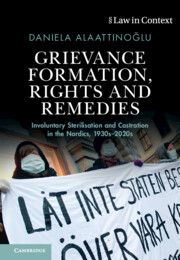 Grievance Formation, Rights and Remedies
Grievance Formation, Rights and Remedies from Part I - Developing Rights and Wrongs
Published online by Cambridge University Press: 18 August 2023
This chapter introduces the central research agenda, methodology, and scope of the book, centring the concept of grievance formation. Discussing the legal foundations and modalities of remedies in international law, the chapter poses the question of state remedial responsibilities in relation to the passage of time. This is a central question in the globally emerging discussions on whether states ought to remedy sterilisation or castration practices in their past. Furthermore, the chapter lays down the theoretical framework for the book’s use of the concept of grievance formation. As employed in social movement theory, this concept describes the process of people starting to address harmful experiences as common grievances. In this chapter, the concept is initially introduced into legal research by linking it with rights mobilisation: how victims of rights violations redefine traumatic experiences as individual or common grievances, rights violations, and legal harm to be remedied. As such, the concept offers a theoretical framework to understand how and why some victims of rights violations begin to conceptualise themselves as such and demand state responsibility, while others might not; why victims are publicly and institutionally recognised and redressed to different extents.
To save this book to your Kindle, first ensure [email protected] is added to your Approved Personal Document E-mail List under your Personal Document Settings on the Manage Your Content and Devices page of your Amazon account. Then enter the ‘name’ part of your Kindle email address below. Find out more about saving to your Kindle.
Note you can select to save to either the @free.kindle.com or @kindle.com variations. ‘@free.kindle.com’ emails are free but can only be saved to your device when it is connected to wi-fi. ‘@kindle.com’ emails can be delivered even when you are not connected to wi-fi, but note that service fees apply.
Find out more about the Kindle Personal Document Service.
To save content items to your account, please confirm that you agree to abide by our usage policies. If this is the first time you use this feature, you will be asked to authorise Cambridge Core to connect with your account. Find out more about saving content to Dropbox.
To save content items to your account, please confirm that you agree to abide by our usage policies. If this is the first time you use this feature, you will be asked to authorise Cambridge Core to connect with your account. Find out more about saving content to Google Drive.